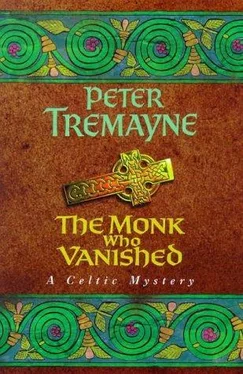Peter Tremayne - The Monk Who Vanished
Здесь есть возможность читать онлайн «Peter Tremayne - The Monk Who Vanished» весь текст электронной книги совершенно бесплатно (целиком полную версию без сокращений). В некоторых случаях можно слушать аудио, скачать через торрент в формате fb2 и присутствует краткое содержание. Жанр: Исторический детектив, на английском языке. Описание произведения, (предисловие) а так же отзывы посетителей доступны на портале библиотеки ЛибКат.
- Название:The Monk Who Vanished
- Автор:
- Жанр:
- Год:неизвестен
- ISBN:нет данных
- Рейтинг книги:3 / 5. Голосов: 1
-
Избранное:Добавить в избранное
- Отзывы:
-
Ваша оценка:
- 60
- 1
- 2
- 3
- 4
- 5
The Monk Who Vanished: краткое содержание, описание и аннотация
Предлагаем к чтению аннотацию, описание, краткое содержание или предисловие (зависит от того, что написал сам автор книги «The Monk Who Vanished»). Если вы не нашли необходимую информацию о книге — напишите в комментариях, мы постараемся отыскать её.
The Monk Who Vanished — читать онлайн бесплатно полную книгу (весь текст) целиком
Ниже представлен текст книги, разбитый по страницам. Система сохранения места последней прочитанной страницы, позволяет с удобством читать онлайн бесплатно книгу «The Monk Who Vanished», без необходимости каждый раз заново искать на чём Вы остановились. Поставьте закладку, и сможете в любой момент перейти на страницу, на которой закончили чтение.
Интервал:
Закладка:
Eadulf expression was bland. ‘Yes. I think a Brother left the courtyard hurriedly on the far side.’
‘Shame on him. Even in a hurry a member of the abbey is taught not to slam a door and disturb God’s peace in this holy place.’
Fidelma came up, overhearing the abbot’s remarks.
‘Sometimes the desire to fulfil a task quickly makes one forget one’s etiquette, Ségdae,’ she murmured.
‘If I discover the culprit, he will be given penance enough to remember the lesson,’ the abbot muttered irritably and strode off.
Fidelma turned to Eadulf with a meditative look.
‘Wasn’t it young Brother Daig who said that he was awakened in the night by a slamming door? I thought it was unusual for a member of a community to slam a door. Perhaps the same person has slammed a door on both occasions? A pity we do not know who it was.’
Eadulf smiled conceitedly.
‘But we do.’
Fidelma almost swallowed in surprise.
‘You recognised the person? Then tell me!’ she gasped impatiently.
‘The man half turned in the open doorway as he was closing it. The light was full on him as he was framed there. It was Brother Bardan.’
Chapter Fifteen
Eadulf had been dispatched to gather what information he could on Brother Bardán’s background from Abbot Ségdae with strict instructions to tell the abbot that nothing should be said that might alert Bardán that he was being investigated. Fidelma herself went in search of the highly strung dálaigh of the Uí Fidgente.
She found him, at last, in the tech screpta, the library of the abbey. Imleach was possessed of one of the great libraries in the kingdom for there were well over two hundred manuscript books housed there. Most of the books were not kept on shelves but in leather satchels, hung on pegs or racks round the wall. Each satchel contained one manuscript volume. But one section of the library contained some elaborately wrought and beautifully ornamented leather-bound volumes embellished with silver plating. A few of these were contained in small cases called labor-chomet, or book holders, which were made of metal in order to preserve works of great value. The ‘Confession of Patrick’, the earliest ‘Annals of Imleach’ and a ‘Life of Ailbe’ were amongst them.
Imleach had in its library an area in which scribes worked and studied. When Fidelma entered there were several members of the community bent over their tasks of copying books. The copying was being done on long, thin, smooth, rectangular boards on which vellum was stretched. The vellum was variously made from the skins of sheep, goats or calves. The scribes used ink made from carbon kept in cows’ horns and the work was done with pens made from the quills of geese, swans or even crows.
She noted that a few of the scribes were reading from the flesc filidh, or poet’s rods, staves and wands made from yew or apple tree on which Ogham, the ancient form of Irish writing, was carved.
Fidelma paused a moment to take in the atmosphere of the large room which comprised the abbey’s library. She always felt pleasure at being in a library; it gave her a sense of being in touch with both past and future at the same time for here was the knowledge of the past being transmitted through the present to the scribes of the future. She experienced a sense of childlike wonder whenever she enteredany library, but Imleach was regarded as one of the greatest in the kingdom.
She spotted Solam almost at once, apart from the scribes, seated at a reading table in a corner of the library. She walked quietly across to his table.
‘I see that you are rested and not ill-affected by your experience, Solam.’ Her tone was slightly ironic as she seated herself in front of him.
He glanced up in apparent irritation at being interrupted.
‘It is a matter of luck that I was not injured, Sister,’ he replied, also speaking softly so as not to disturb the others in the library. ‘I will still register my complaint to the Chief Brehon of the five kingdoms. Do not think that you will be able to persuade me otherwise.’
He thrust out his chin defiantly.
‘I would not dream of doing so,’ Fidelma returned gravely. ‘However, as a dálaigh of some reputation …’ she paused pointedly,’ I know that you will take into account the nervousness of the people in view of what happened last night.’
Solam was not mollified. ‘It does not mitigate the fact that, having identified myself, those people tried to kill me.’
‘But you were not killed,’ pointed out Fidelma. ‘However, I would not dream of preventing you from registering your complaint.’
Solam sniffed deprecatingly. ‘I shall do so.’
‘Of course, compensation in settlement to your complaint is only given if it can be justified. That is, if the people had no valid cause to fear you. If they did not genuinely believe that they had been attacked by the Uí Fidgente, then, of course, there would be no cause for their anger to be raised against you. However, if they did believe they had been attacked …’
She waved her hand to dismiss the matter and smiled.
‘You do not have to instruct me in law,’ snapped Solam, his voice rising so that a number of scribes looked up. A stentorian voice from the chief librarian, seated at his central desk, hissed a command for silence.
‘How well do you know Brother Bardan?’ Fidelma continued innocently.
The little man looked at her disdainfully.
‘Do you think it proper that we, as opposing counsels, should be discussing any matters affecting the hearing at Cashel?’
Fidelma felt her temper stirring but kept it in check.
‘I was not aware that we were doing so,’ she replied, trying to soften the icy tinge to her voice. ‘Though from what you tell me you havebeen informed of all the details of the case so it matters not if we talk in general terms.’
‘As a dálaigh, it is my task to question who I please. My Prince, Donennach, sent a messenger instructing me to proceed to Cashel and the messenger had a copy of the protocol drawn up by Donndubhain, the tanist of Cashel. Therefore, I set out immediately.’
Fidelma smiled quickly. ‘I suppose that the messenger from Cashel told you that I had come to Imleach, which is why you came here?’
Solam flushed.
‘I came here …’ he began, and then he realised the path he had been drawn along.
‘The road from Luimneach to Cashel runs north of here. So I deduced that you thought it wise to come here first. Is that so?’
The little man’s eyes narrowed.
‘You are a very clever lady, Fidelma,’ he said icily. ‘I have heard of your reputation.’
‘That is gratifying.’ She paused, allowing the silence to press the question.
‘As a dálaigh,’ Solam explained, ‘it was my duty to see if you had been able to identify the crucifix. I understand that you have. It was the crucifix of Ailbe who founded this abbey; a crucifix which has disappeared from the chapel where it has been kept for the last century or more.’
Fidelma tried to hide her surprise that Solam had been able to gather the information so quickly.
The dálaigh was sitting back with a self-satisfied look.
‘I did not know that Brother Bardan was such a loquacious man,’ she said quietly.
Solam did not attempt to deny his information had come from the apothecary. ‘He is certainly more helpful than many here.’
‘You do your reputation justice, Solam,’ Fidelma replied.
‘You will find that I now have proof that this assassination plot was not inspired by the Uí Fidgente as you have claimed it to be.’
‘You have been misinformed, Solam,’ countered Fidelma. ‘I have never claimed anything. You mention the duties of a dálaigh. It is also my duty to gather the facts and present them to the Brehons. Other people have made claims, not 1. I shall continue to seek the truth until I am satisfied that I have found it.’
Читать дальшеИнтервал:
Закладка:
Похожие книги на «The Monk Who Vanished»
Представляем Вашему вниманию похожие книги на «The Monk Who Vanished» списком для выбора. Мы отобрали схожую по названию и смыслу литературу в надежде предоставить читателям больше вариантов отыскать новые, интересные, ещё непрочитанные произведения.
Обсуждение, отзывы о книге «The Monk Who Vanished» и просто собственные мнения читателей. Оставьте ваши комментарии, напишите, что Вы думаете о произведении, его смысле или главных героях. Укажите что конкретно понравилось, а что нет, и почему Вы так считаете.












